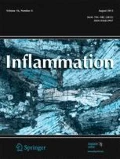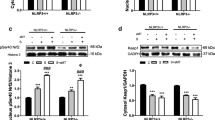Abstract
Cardiac dysfunction is a major cause leading to multiple organ failure in sepsis. Beclin-1-dependent autophagy has been evidenced to exert protective effects on hearts in sepsis. However, the mechanisms on how Beclin-1 and autophagy are regulated remains enigmatic. To explore the detailed mechanisms controlling Beclin-1-dependent autophagy in septic heart and whether melatonin could protect against sepsis via regulating cardiac autophagy, adult Sprague-Dawley (SD) rats were subjected to cecal ligation and puncture (CLP) to induce sepsis. Rats were intraperitoneally administrated with 30 mg/kg melatonin within 5-min post-CLP surgery. Our data showed that sepsis induced Becline-1 acetylation and inhibited autophagy in hearts, resulting in impaired cardiac function. However, melatonin treatment facilitated Beclin-1 deacetylation and increased autophagy in septic hearts, thus improved cardiac function. Moreover, melatonin increased the expression and activity of Sirtuin 1 (Sirt1), and inhibition of Sirt1 abolished the protective effects of melatonin on Beclin-1 deacetylation and cardiac function. In conclusion, increased Beclin-1 acetylation was involved in impaired autophagy in septic hearts, while melatonin contributed to Beclin-1 deacetylation via Sirt1, leading to improved autophagy and cardiac function in sepsis. Our study sheds light on the important role of Beclin-1 acetylation in regulating autophagy in sepsis and suggests that melatonin is a potential candidate drug for the treatment of sepsis.





Similar content being viewed by others
Data Availability
All data and materials are included in this article.
References
Singer, Mervyn, Clifford S. Deutschman, Christopher Warren Seymour, Manu Shankar-Hari, Djillali Annane, Michael Bauer, Rinaldo Bellomo, Gordon R. Bernard, Jean-Daniel Chiche, Craig M. Coopersmith, Richard S. Hotchkiss, Mitchell M. Levy, John C. Marshall, Greg S. Martin, Steven M. Opal, Gordon D. Rubenfeld, Tom van der Poll, Jean-Louis Vincent, and Derek C. Angus. 2016. The third international consensus definitions for sepsis and septic shock (sepsis-3). JAMA 315 (8): 801–810.
Fleischmann, Carolin, André Scherag, Neill Kj Adhikari, Christiane S. Hartog, and Konrad Reinhart. 2016. Assessment of global incidence and mortality of hospital-treated sepsis. Current estimates and limitations. American Journal of Respiratory and Critical Care Medicine 193 (3): 259–272.
Landesberg, G., D. Gilon, Y. Meroz, M. Georgieva, P.D. Levin, S. Goodman, A. Avidan, R. Beeri, C. Weissman, and A.S. Jaffe. 2012. Diastolic dysfunction and mortality in severe sepsis and septic shock. European Heart Journal 7: 895.
Merx, M.W., and C. Weber. 2007. Sepsis and the heart. Circulation 116 (7): 793–802.
Dikic, Ivan, and Zvulun Elazar. 2018. Mechanism and medical implications of mammalian autophagy. Nature Reviews Molecular Cell Biology 19 (6): 349–364.
Ravanan, Palaniyandi, Ida Florance Srikumar, and Priti Talwar. 2017. Autophagy: the spotlight for cellular stress responses. Life Sciences 188: 53–67.
Yu, T.Y., D. Liu, M. Gao, P.L. Yang, M. Zhang, F. Song, X. Zhang, and Y. Liu. 2019. Dexmedetomidine prevents septic myocardial dysfunction in rats via activation of alpha 7nAChR and PI3K/Akt- mediated autophagy. Biomedicine & Pharmacotherapy 2019: 109231.
Erfei, Zhang, Zhao Xiaoying, Nan Li, Yan Jinqi, and Ke, and Tu. 2019. Minocycline promotes cardiomyocyte mitochondrial autophagy and cardiomyocyte autophagy to prevent sepsis-induced cardiac dysfunction by Akt/mTOR signaling. Apoptosis 24 (3-4): 369–381.
Maejima, Yasuhiro, Mitsuaki Isobe, and Junichi Sadoshima. 2016. Regulation of autophagy by beclin 1 in the heart. Journal of Molecular and Cellular Cardiology 95: 19–25.
Yuxiao, Sun, Yao Xiao, Zhang Qing-Jun, Min Zhu, Liu Zhi-Ping, Ci Bo, Yang Xie, Carlson Deborah, Beverly A. Rothermel, and Sun Yuxiang. 2018. Beclin-1-dependent autophagy protects the heart during sepsis. Circulation 138 (20): 2247–2262.
Sun, Ting, Xuan Li, Peng Zhang, Wen Dan Chen, Hai Liang Zhang, Dan Dan Li, Rong Deng, Xiao Jun Qian, Jiao Lin, and Jiao Ji. 2015. Acetylation of Beclin 1 inhibits autophagosome maturation and promotes tumour growth. Nature Communications 6: 7215.
Esteves, A. Raquel, Filipa Filipe, João D. Magalhães, Diana F. Silva, and Sandra M. Cardoso. 2019. The role of Beclin-1 acetylation on autophagic flux in Alzheimer’s disease. Molecular Neurobiology 56 (8): 5654–5670.
Ren, Jun, Lifang Yang, Li Zhu, Xihui Xu, Asli F. Ceylan, Wei Guo, Jian Yang, and Yingmei Zhang. 2017. Akt2 ablation prolongs life span and improves myocardial contractile function with adaptive cardiac remodeling: role of Sirt1-mediated autophagy regulation. Aging Cell 16 (5): 976–987.
Zhang, Wen Xuan, Bai Mei He, Ying Wu, Jian Feng Qiao, and Zhen Yu Peng. 2018. Melatonin protects against sepsis-induced cardiac dysfunction by regulating apoptosis and autophagy via activation of SIRT1 in mice. Life Sciences 217: 8–15.
Shangwen, Pan, Yan Wu, Pei Lei, Li Shengnan, Song Limin, Xia Haifa, Yaxin Wang, Yuan Yu, Xiaobo Yang, and Shu Huaqing. 2018. BML-111 reduces neuroinflammation and cognitive impairment in mice with sepsis via the SIRT1/NF-κB signaling pathway. Frontiers in Cellular Neuroscience 12: 267.
Chen, X., Z. Pan, Z. Fang, W. Lin, S. Wu, F. Yang, Y. Li, H. Fu, H. Gao, and S. Li. 2018. Omega-3 polyunsaturated fatty acid attenuates traumatic brain injury-induced neuronal apoptosis by inducing autophagy through the upregulation of SIRT1-mediated deacetylation of Beclin-1. Journal of Neuroinflammation 15 (1): 310.
Rüdiger, and Hardeland. 2018. Melatonin and inflammation-story of a double-edged blade. Journal of Pineal Research 65 (4): e12525.
Satyanarayanan, K. Senthil, Su Huanxing, Yi Wen Lin, and Su. Kuan Pin. 2018. Circadian rhythm and melatonin in the treatment of depression. Current Pharmaceutical Design 65 (4): e12525.
Claustrat, B., and J. Leston. 2015. Melatonin: physiological effects in humans. Neurochirurgie 61 (2-3): 77–84.
Fernández, Anna, Raquel Ordónez, Russel J. Reiter, Javier González-Gallego, and José L. Mauriz. 2015. Melatonin and endoplasmic reticulum stress: relation to autophagy and apoptosis. Journal of Pineal Research 59 (3): 292–307.
Simko, Fedor, Kristina Repova Bednarova, Kristina Krajcirovicova, Jaroslav Hrenak, Peter Celec, Natalia Kamodyova, Lucia Gajdosechova, Stefan Zorad, and Michaela Adamcova. 2015. Melatonin reduces cardiac remodeling and improves survival in rats with isoproterenol-induced heart failure. Journal of Pineal Research 57 (2): 177–184.
Ding, Mingge, Jiao Ning, Na Feng, Zeyang Li, Zhenhua Liu, Yuanbo Wang, Yueming Wang, Xing Li, Cong Huo, and Xin Jia. 2018. Dynamin-related protein 1-mediated mitochondrial fission contributes to post-traumatic cardiac dysfunction in rats and the protective effect of melatonin. Journal of Pineal Research 64 (1): e12447.
Böckmann, Ineke, Jonas Lischka, Beatrice Richter, Jennifer Deppe, and Maren Leifheit-Nestler. 2019. FGF23-mediated activation of local RAAS promotes cardiac hypertrophy and fibrosis. International Journal of Molecular Sciences 20 (18): 4634.
Se-Jin, Jeong, Zhang Xiangyu, Rodriguez-Velez Astrid, Evans Trent, and Babak. 2018. p62/SQSTM1 and selective autophagy in cardiometabolic diseases. Antioxidants & Redox Signaling 31 (6): 458–471.
Jia, Yanhui, Zhao Zheng, Yunchuan Wang, Qin Zhou, Weixia Cai, Wenbin Jia, Longlong Yang, Maolong Dong, Xiongxiang Zhu, and Su. Linlin. 2015. SIRT1 is a regulator in high glucose-induced inflammatory response in RAW264.7 cells. PLoS One 10 (5): e0120849.
Quera-Salva, M.A., and B. Claustrat. 2018. Melatonin: physiological and pharmacological aspects related to sleep: the interest of a prolonged-release formulation (Circadin (R)) in insomnia. Encephale-Revue De Psychiatrie Clinique Biologique Et Therapeutique 44 (6): 548–557.
Sánchez-Barceló, Emilio J., Noemi R. Revilla, María D. Mediavilla, Carmen Martínez-Cué, and Russel J. Reiter. 2017. Clinical uses of melatonin in neurological diseases and mental and behavioural disorders. Current Medicinal Chemistry 24 (35): 3851–3878.
Valdés-Tovar, Marcela, Rosa Estrada-Reyes, Héctor Solís-Chagoyán, Jesús Argueta, Ana María Dorantes-Barrón, Daniel Quero-Chávez, Ricardo Cruz-Garduo, Montserrat G. Cercós, Citlali Trueta, and Julián Oikawa-Sala. 2018. Circadian modulation of neuroplasticity by melatonin: a target in the treatment of depression. British Journal of Pharmacology 175 (16): 3200–3208.
Acua-Castroviejo, Darío, Ibtissem Rahim, Carlos Acua-Fernández, Marisol Fernández-Ortiz, and Germaine Escames. 2017. Melatonin, clock genes and mitochondria in sepsis. Cellular and Molecular Life Sciences 74 (21): 3965–3987.
Renésha, Henderson, Kim Seungyeon, and Euni Lee. 2018. Use of melatonin as adjunctive therapy in neonatal sepsis: a systematic review and meta-analysis. Complementary Therapies in Medicine 39: 131–136.
Sun, Yuxiao, Ying Cai, and Qun S. Zang. 2019. Cardiac autophagy in sepsis. Cells 8 (2): 141-153.
Hsieh, C.H., P.Y. Pai, H.W. Hsueh, S.S. Yuan, and Y.C. Hsieh. 2011. Complete induction of autophagy is essential for cardioprotection in sepsis. Annals of Surgery 253: 1190–1200.
Jiaojiao, Pang, Peng Hu, Wang Shuyi, Xu Xihui, Feng, and Qiurong. 2019. Mitochondrial ALDH2 protects against lipopolysaccharide-induced myocardial contractile dysfunction by suppression of ER stress and autophagy. Biochimica et Biophysica Acta Molecular Basis of Disease 1865 (6): 1627–1641.
Sun, Ting, Jiao Lin, Yangxia Wang, Yan Yu, and Ming Liang. 2018. SIRT1 induces epithelial-mesenchymal transition by promoting autophagic degradation of E-cadherin in melanoma cells. Cell Death & Disease 9 (2): 445–451.
Zhao, Lei, Rui An, Yang Yang, Xiangmin Yang, Haixiao Liu, Yue Liang, Xia Li, Yan Lin, Russel J. Reiter, and Qu. Yan. 2015. Melatonin alleviates brain injury in mice subjected to cecal ligation and puncture via attenuating inflammation, apoptosis, and oxidative stress: the role of SIRT1 signaling. Journal of Pineal Research 59 (2): 230–239.
Chen, Jian, Hongzhen Xia, Zhang Lin, Huan Zhang, and Xiaogen Tao. 2019. Protective effects of melatonin on sepsis-induced liver injury and dysregulation of gluconeogenesis in rats through activating SIRT1/STAT3 pathway. Biomedicine & Pharmacotherapy 117: 109150.
Acknowledgments
All authors make significant contributions to this work.
Funding
This research was funded by the National Natural Science foundation of China (NSFC81700320), Chongqing Science and Technical Commission Basic Research Funding (CSTC 2019JCY-MSXMX0827) and Basic Research Training Project of the First Affiliated Hospital of Chongqing Medical University (PyJJ2017-11).
Author information
Authors and Affiliations
Contributions
Conceptualization, Xiao-Wen Wang; methodology, Qiang-Zhong Pi, Xiao-Wen Wang, Zhao-Lei Jian, Dan Chen; formal analysis, Xiao-Wen Wang, Qing-Chen Wu; investigation, Qiang-Zhong Pi, Xiao-Wen Wang, Zhao-Lei Jian, Dan Chen; writing—original draft preparation, Qiang-Zhong Pi; writing—review and editing, Xiao-Wen Wang; supervision, Qing-Chen Wu; funding acquisition, Xiao-Wen Wang. All authors have read and agreed to the published version of the manuscript.
Corresponding author
Ethics declarations
Conflict of Interests
The authors declare that they have no conflict of interest.
Ethics Approval and Consent to Participate
The ethics review board of Chongqing Medical University approved the study protocol. All animal experiments comply with the ethical requirements of the animal council. No human data were included in this study.
Consent for Publication
Not applicable.
Additional information
Publisher’s Note
Springer Nature remains neutral with regard to jurisdictional claims in published maps and institutional affiliations.
Supplementary Information
ESM 1
(DOCX 270 kb).
Rights and permissions
About this article
Cite this article
Pi, QZ., Wang, XW., Jian, ZL. et al. Melatonin Alleviates Cardiac Dysfunction Via Increasing Sirt1-Mediated Beclin-1 Deacetylation and Autophagy During Sepsis. Inflammation 44, 1184–1193 (2021). https://doi.org/10.1007/s10753-021-01413-2
Received:
Revised:
Accepted:
Published:
Issue Date:
DOI: https://doi.org/10.1007/s10753-021-01413-2




